Perhaps because I teach courses about apocalyptic literature, and I’m an avid fan of end of the world stories, I have read and watched enough of the genre that I’ve noted a significant, if not disturbing trend. This is a genre that necessarily involves some mayhem, so a few deaths can be permitted, but increasingly murderous rampages are becoming a shortcut to audience titillation even as they act as a cheap plot device. Certainly we can admit that Alfonso Cuarón’s Children of Men might not have been as 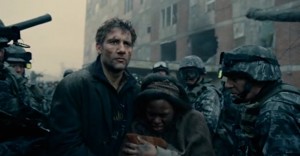 video-game interesting if the main characters weren’t constantly being chased and shot at, but was that really the import of the film? Ostensibly, the film was about protecting the woman’s unborn child, and if we admit the truth, her egg potential, but much more of the screen time was devoted to her danger than her safety.
video-game interesting if the main characters weren’t constantly being chased and shot at, but was that really the import of the film? Ostensibly, the film was about protecting the woman’s unborn child, and if we admit the truth, her egg potential, but much more of the screen time was devoted to her danger than her safety.
A lot of this death, killing thousands of zombies in the Resident Evil franchise 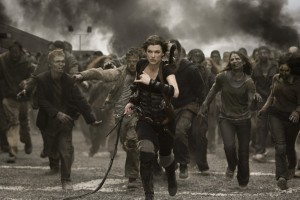 even though dozens of murders could just as easily have answered the plot, is used to heighten old flight-or-fight instincts in a human who has long since gone to ground in the safety of the couch. Playing with the heroes’ survival, and teasing the audience with their own expectations by alternately terrifying and satiating them has become so extreme and heavy-handed that the viewers may begin to doubt that the narrative is worth their attention. Both killing and the special effects in these films become blunt instruments that bludgeon to entertain, rather than probe to evoke.
even though dozens of murders could just as easily have answered the plot, is used to heighten old flight-or-fight instincts in a human who has long since gone to ground in the safety of the couch. Playing with the heroes’ survival, and teasing the audience with their own expectations by alternately terrifying and satiating them has become so extreme and heavy-handed that the viewers may begin to doubt that the narrative is worth their attention. Both killing and the special effects in these films become blunt instruments that bludgeon to entertain, rather than probe to evoke.
Intricate and highly doubtful plot elements conspire to kill the people we care about—or, I would argue, increasingly care less about—in an effort to artificially boost viewer or reader interest. Caught by these portrayals, we forget to ask if the hero should survive at all. The super soldier hero who has killed umpteen zombies or terrorists—or, in my time, communists—has necessarily become identical to the enemy they were saving us from.
Also, if we can get past the spurting arteries, we begin to wonder what peaceful world the hero is trying to preserve. Typically, they spend their screen time occupied with saving their love interest, but few ask if they have become the maniacal killer in order to protect from their equally murderous twin. Instead, as viewers, we cheer the survivors and forget how they have achieved their victory and forget to ask if it was worthwhile. We forget that there is no point in becoming a mass killer to protect society if you are defending society from mass killers. Then you merely turn into the enemy you despise and fear. Increasingly, we have become focused on the killing and lost track of the values our heroes are killing to protect.
I am more interested in what we are trying to preserve than I am the mechanism we use to preserve it. If we are protecting the one we love, then what is that relationship about, and how can plot elements—zombies or whatever—help to further the laudable goal of investigating that relationship?
The Walking Dead is a series that excites millions of viewers. My friend told me how riveting the show was, 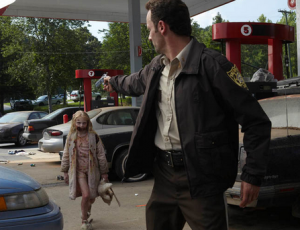 but when I took her advice and watched the opening sequence, I saw the hero Rick Grimes, played by Andrew Lincoln, shoot a little girl in the head. Instead of being intrigued by the storyline, I began to wonder what the producers were hoping to tap into. Were they so cynical about their audience that they thought that killing a child would engage viewer interest? I couldn’t help but wonder why it was necessary to kill the girl.
but when I took her advice and watched the opening sequence, I saw the hero Rick Grimes, played by Andrew Lincoln, shoot a little girl in the head. Instead of being intrigued by the storyline, I began to wonder what the producers were hoping to tap into. Were they so cynical about their audience that they thought that killing a child would engage viewer interest? I couldn’t help but wonder why it was necessary to kill the girl.
For me, that moment effectively defined my reaction to the series. Perhaps it had many redeeming features beyond that opening sequence, but the blatant and heavy-handed manipulation of the viewer, without any redeeming plot purpose that I could discern, smacked to me of prurient sensationalism writ large across the screen in a little girl’s blood. Perhaps they are right, and we’ve become jaded as an audience, but such images of carnage seem to be performed for the mere shock value, as one show after another tries to one-up their peers.
I think that’s why Cormac McCarthy’s The Road never resonated with me. I sympathized with the father trying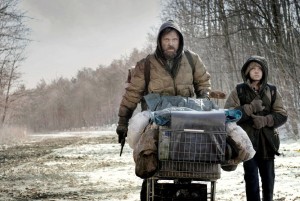 to find a haven for his son, but I didn’t buy that as soon as danger threatened everyone would become an inarticulate cannibal. The cannibals seem shoehorned into the narrative so the reader could feel the thrill of imminent death around every corner, and every few minutes we become aware of the horror when yet another cannibal runs out of the trees.
to find a haven for his son, but I didn’t buy that as soon as danger threatened everyone would become an inarticulate cannibal. The cannibals seem shoehorned into the narrative so the reader could feel the thrill of imminent death around every corner, and every few minutes we become aware of the horror when yet another cannibal runs out of the trees.
Jack McDevitt’s Eternity Road kills a few people on a relatively harrowing journey, but that is not the main concern of the plot. Instead, it is used to ensure that the characters 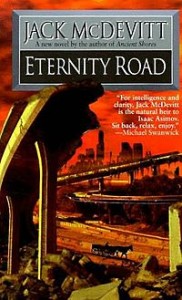 rethink the purpose of their quest so that we as readers are reminded that civilization and scientific thought are inherently worthwhile projects. Also, the deaths provide a reason for the characters to express sentiments that have slowly developed over the journey—and thus become a driver for character development. McDevitt’s narrative doesn’t stop in its tracks, and forget all other purposes, in order to wallow in lurid and unforgettable images of death.
rethink the purpose of their quest so that we as readers are reminded that civilization and scientific thought are inherently worthwhile projects. Also, the deaths provide a reason for the characters to express sentiments that have slowly developed over the journey—and thus become a driver for character development. McDevitt’s narrative doesn’t stop in its tracks, and forget all other purposes, in order to wallow in lurid and unforgettable images of death.
Perhaps the best example of a book that remains realistic, within the bounds of its invented world, and yet does not dwell on the sensationalistic, is Dale Pendell’s The Great Bay: Chronicles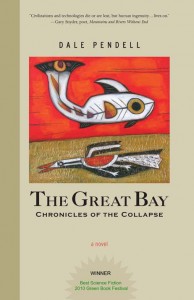 of the Collapse. Pendell’s is one of the few texts that takes on a boundless cataclysm in the form of plague, climatic collapse, environmental toxins, bandit armies, and homegrown murder, but he doesn’t let those narrative elements take over his story. Ultimately, his tale is one of human inventiveness and the wish for community, as people band together for comfort and mutual assistance. A few invaders enter Pendell’s world, cannibals during times of starvation and malicious individuals in search of victims, but Pendell makes it clear—by the brief narrative time devoted to those moments—that his main story is elsewhere.
of the Collapse. Pendell’s is one of the few texts that takes on a boundless cataclysm in the form of plague, climatic collapse, environmental toxins, bandit armies, and homegrown murder, but he doesn’t let those narrative elements take over his story. Ultimately, his tale is one of human inventiveness and the wish for community, as people band together for comfort and mutual assistance. A few invaders enter Pendell’s world, cannibals during times of starvation and malicious individuals in search of victims, but Pendell makes it clear—by the brief narrative time devoted to those moments—that his main story is elsewhere.
I wonder how much our own ideas about people and end of the world scenarios define the stories we write and want to read. In the end, the stories I tell have as much to do with my own views of humanity as anything else. I don’t think we slough off civilization quite so readily. I think William Golding’s Lord of the Flies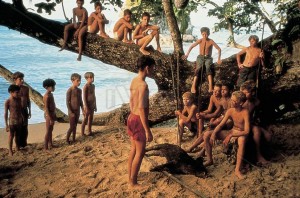 tells more about our fears of groupthink than our natural tendencies. While some people might be drawn to bad actions by circumstances or personal predilections, most will try to protect the weak, pull together to make life better for all, and remain honest despite the lack of police.
tells more about our fears of groupthink than our natural tendencies. While some people might be drawn to bad actions by circumstances or personal predilections, most will try to protect the weak, pull together to make life better for all, and remain honest despite the lack of police.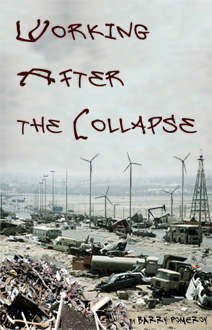
My collections of short stories, Working after the Collapse and Surviving the Apocalypse both take strife and societal collapse as their departure point, but I am much more interested in human resilience and the rebuilding 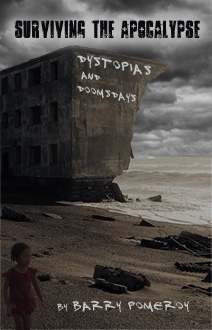 of community than I am the crunch of bone as someone feasts on brains. I don’t think I’m alone in this. My two story collections have never inspired the same initial interest as my novel Not Quite Dark: A Post-Apocalyptic Adoption Story. I wonder if it’s because the focus of that book is more on the survivors and less on the survival.
of community than I am the crunch of bone as someone feasts on brains. I don’t think I’m alone in this. My two story collections have never inspired the same initial interest as my novel Not Quite Dark: A Post-Apocalyptic Adoption Story. I wonder if it’s because the focus of that book is more on the survivors and less on the survival.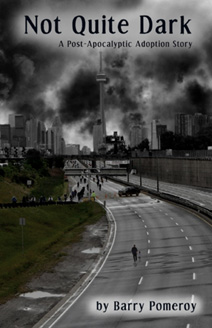
For me, the use of murder and rape as cheap sensationalism, where it is entirely unnecessary to the plot, is as much a cardinal sin as placing a science fiction story in space that could be told in a barn. Terrible things happen, and in an apocalyptic world, they might happen more often, but is that the tale we want to tell? For my own part, I am more interested in the nuts and bolts of survival, as well as the interpersonal story of those struggling, than I am the mass killing that seems to be required in most apocalyptic scenarios. I think in dwelling on those more salacious details, we lose track of the best offerings of post-apocalyptic stories: the chance to reaffirm our faith in human resourcefulness and altruism even while the world crumbles.
